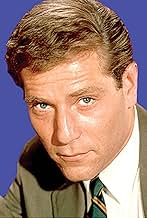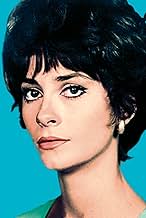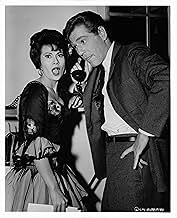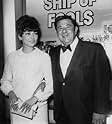AVALIAÇÃO DA IMDb
7,0/10
7,4 mil
SUA AVALIAÇÃO
Um grupo variado de passageiros de um navio com destino à Alemanha de pouco antes da Segunda Guerra representa um microcosmo da sociedade dos início dos anos 30.Um grupo variado de passageiros de um navio com destino à Alemanha de pouco antes da Segunda Guerra representa um microcosmo da sociedade dos início dos anos 30.Um grupo variado de passageiros de um navio com destino à Alemanha de pouco antes da Segunda Guerra representa um microcosmo da sociedade dos início dos anos 30.
- Direção
- Roteiristas
- Artistas
- Ganhou 2 Oscars
- 5 vitórias e 13 indicações no total
José Ferrer
- Siegfried Rieber
- (as Jose Ferrer)
José Greco
- Pepe
- (as Jose Greco)
Heinz Rühmann
- Julius Löwenthal
- (as Heinz Ruehmann)
- Direção
- Roteiristas
- Elenco e equipe completos
- Produção, bilheteria e muito mais no IMDbPro
Avaliações em destaque
"Ship Of Fools" (1965) movie is better than K. A. Porter's book, and possibly the best ensemble top actors movie ever made.
The movie got two Academy Awards....one for best cinematography, and the other for best art direction. Both deserved.
"Ship Of Fools" (1965) also deserved (but did not get, sadly) multiple "Best Actor" and Best Actress" awards ["Best Supporting Actor/ Actress awards, also].
High quality, in-depth acting of true talent and accomplishment have seldom ever reached the levels achieved in this movie, done repeatedly, again and again and again, from start to finish.
The movie contained at least half a dozen (possibly more) Academy Award winner best actor performances.....at least three best actor academy award winners performed (incredibily) in this movie (Lee Marvin, Vivien Leigh, and Jose Ferrer), and others (some who may have gotten academy awards I overlooked) were also wonderful in all ways (Simone Signoret, Oscar Werner, Michael Dunn, Elizabeth Ashley, George Segal, Gila Golan, Jose Greco, and Barbara Luna....who sang the famous "Dites Moi" song in South Pacific on the Broadway stage when she was a little girl in 1949!).
The titles at the start of movie are incredible, and deserve to be ranked with the best of all movie titles ever presented (someday, a special award for movie titles will be established....if this has not already been done, it is certainly an unmet need.....movie titles are important, are an art unto themselves, and a major asset to movies when done well.........see the titles for Bullitt 1968 and North By Northwest 1959 as only two examples of "the best of the best movie titles...the "Ship Of Fools" 1965 movie titles are part of the "the best of the best.") The Abby Mann written screenplay is really an original screenplay with an original story, by far better than the best selling Katherine Anne Porter novel also titled "Ship Of Fools" .... not at all the same as the book....better! Stanley Kramer's direction is wonderful.
Original music by Ernest Gold in the movie includes a German language song performed very well by Jose Ferrer. The title of the song is "Heute abend geh'n wir bummein auf der Reeperbahn," and it is a true "gemutlicheit" German language song, indeed, even if it was written in the USA for a Hollywood, English language movie.
This movie is a true gem, and deserves to be ranked as one of the best movies of all times.
All movie actors (I am one) should see this movie....it's a chance to see "the best of the best" one after the other after the other after the other.
Acting just doesn't get better than is the case in "Ship Of Fools" (1965).
-------------- Written by Tex Allen, SAG Actor Email Tex Allen at TexAllen@Rocketmail.Com Visit WWW.IMDb.Me/TexAllen for movie credits and biography information.
The movie got two Academy Awards....one for best cinematography, and the other for best art direction. Both deserved.
"Ship Of Fools" (1965) also deserved (but did not get, sadly) multiple "Best Actor" and Best Actress" awards ["Best Supporting Actor/ Actress awards, also].
High quality, in-depth acting of true talent and accomplishment have seldom ever reached the levels achieved in this movie, done repeatedly, again and again and again, from start to finish.
The movie contained at least half a dozen (possibly more) Academy Award winner best actor performances.....at least three best actor academy award winners performed (incredibily) in this movie (Lee Marvin, Vivien Leigh, and Jose Ferrer), and others (some who may have gotten academy awards I overlooked) were also wonderful in all ways (Simone Signoret, Oscar Werner, Michael Dunn, Elizabeth Ashley, George Segal, Gila Golan, Jose Greco, and Barbara Luna....who sang the famous "Dites Moi" song in South Pacific on the Broadway stage when she was a little girl in 1949!).
The titles at the start of movie are incredible, and deserve to be ranked with the best of all movie titles ever presented (someday, a special award for movie titles will be established....if this has not already been done, it is certainly an unmet need.....movie titles are important, are an art unto themselves, and a major asset to movies when done well.........see the titles for Bullitt 1968 and North By Northwest 1959 as only two examples of "the best of the best movie titles...the "Ship Of Fools" 1965 movie titles are part of the "the best of the best.") The Abby Mann written screenplay is really an original screenplay with an original story, by far better than the best selling Katherine Anne Porter novel also titled "Ship Of Fools" .... not at all the same as the book....better! Stanley Kramer's direction is wonderful.
Original music by Ernest Gold in the movie includes a German language song performed very well by Jose Ferrer. The title of the song is "Heute abend geh'n wir bummein auf der Reeperbahn," and it is a true "gemutlicheit" German language song, indeed, even if it was written in the USA for a Hollywood, English language movie.
This movie is a true gem, and deserves to be ranked as one of the best movies of all times.
All movie actors (I am one) should see this movie....it's a chance to see "the best of the best" one after the other after the other after the other.
Acting just doesn't get better than is the case in "Ship Of Fools" (1965).
-------------- Written by Tex Allen, SAG Actor Email Tex Allen at TexAllen@Rocketmail.Com Visit WWW.IMDb.Me/TexAllen for movie credits and biography information.
A strange, rather offbeat morality tale from Katherine Anne Porter's bulky novel, SHIP OF FOOLS manages to hold interest even though the characters are never fully realized and the full potential of the novel isn't to be found in the screenplay.
It's best described as a multi-episode GRAND HOTEL at sea, episodic with the love story between Simone Signoret and Oskar Werner at the core and easily the best acted piece, despite the soap-opera overtones. Vivien Leigh's bitter American widow is somewhat theatrical--but comes to life finally in the scene where she uses her shoe to beat Lee Marvin when he makes drunken advances to her. She looks somewhat worn and fragile (which the role requires) and this was her last film only two years before her death.
Porter's novel made diabolic use of the twin children who are almost missing from the screenplay. George Segal and Elizabeth Ashley are wasted in lesser roles as young romantics. Michael Dunn is sly and altogether winning as the dwarf who opens and closes the film with his narrative. Charles Korvin is excellent as the ship's Captain who is constantly giving advice to Oskar Werner who stubbornly refuses to listen to his well meaning friend.
If the story interests you, try reading the novel--much more complex, much richer in characters and atmosphere. The film is overlong, has some dull stretches and has a meager score by Ernest Gold that is oddly silent during some of the most emotional moments. A good old-fashioned musical score by someone like Max Steiner would have helped immeasurably in getting over the dull spots.
Summing up: too preachy when dealing with anti-semitism and lacks the punch of the novel.
It's best described as a multi-episode GRAND HOTEL at sea, episodic with the love story between Simone Signoret and Oskar Werner at the core and easily the best acted piece, despite the soap-opera overtones. Vivien Leigh's bitter American widow is somewhat theatrical--but comes to life finally in the scene where she uses her shoe to beat Lee Marvin when he makes drunken advances to her. She looks somewhat worn and fragile (which the role requires) and this was her last film only two years before her death.
Porter's novel made diabolic use of the twin children who are almost missing from the screenplay. George Segal and Elizabeth Ashley are wasted in lesser roles as young romantics. Michael Dunn is sly and altogether winning as the dwarf who opens and closes the film with his narrative. Charles Korvin is excellent as the ship's Captain who is constantly giving advice to Oskar Werner who stubbornly refuses to listen to his well meaning friend.
If the story interests you, try reading the novel--much more complex, much richer in characters and atmosphere. The film is overlong, has some dull stretches and has a meager score by Ernest Gold that is oddly silent during some of the most emotional moments. A good old-fashioned musical score by someone like Max Steiner would have helped immeasurably in getting over the dull spots.
Summing up: too preachy when dealing with anti-semitism and lacks the punch of the novel.
Ship of Fools (1965) directed by Stanley Kramer, is based on the novel by Katherine Anne Porter. The film is a reasonably faithful cinematic adaptation, although it lacks the novel's subtlety and complexity. Director Kramer assembled an all-star cast--including Vivien Leigh (her last film), Simone Signoret, José Ferrer, Lee Marvin, Oskar Werner, José Greco, and George Segal.
The film takes place entirely on shipboard, except for the final scene. Naturally, the close confines of the ship and the lack of privacy bring about forced interactions, as would have been the case in reality. These interactions form the basic plot of both the book and the film.
The time is 1933, so the passengers don't know what we know--things are changing rapidly in Germany and everything will be different in just a year or two. In fact, that's the basic weakness of the plot--it's easy in retrospect to know just how wrong the Jewish salesman is when he assures people that the current unpleasantness will blow over and all will be well.
Some features of the novel were unfortunately omitted from the film, especially the roles of the Spanish twins, Ric and Rac. In the novel, they are the embodiments of senseless evil, and every chapter in which they appear is laden with foreboding. In the film, the children commit one evil act, but it makes no sense because we haven't been prepared for it.
Director Kramer made one choice I consider foolish. In the novel, a young woman named Elsa Lutz is realistically unhappy. She is unattractive, not very intelligent, not gifted or graceful, and her prospects for marriage are bleak. In the film, she is portrayed as a stunning ingénue, who will blossom into an even more stunning woman. No dramatic tension there. Porter had it right, Kramer had it wrong.
All in all, "Ship of Fools" is a classic movie by an excellent director and it's loaded with stars. It's not an essential film, but it's entertaining enough and worth renting.
The film takes place entirely on shipboard, except for the final scene. Naturally, the close confines of the ship and the lack of privacy bring about forced interactions, as would have been the case in reality. These interactions form the basic plot of both the book and the film.
The time is 1933, so the passengers don't know what we know--things are changing rapidly in Germany and everything will be different in just a year or two. In fact, that's the basic weakness of the plot--it's easy in retrospect to know just how wrong the Jewish salesman is when he assures people that the current unpleasantness will blow over and all will be well.
Some features of the novel were unfortunately omitted from the film, especially the roles of the Spanish twins, Ric and Rac. In the novel, they are the embodiments of senseless evil, and every chapter in which they appear is laden with foreboding. In the film, the children commit one evil act, but it makes no sense because we haven't been prepared for it.
Director Kramer made one choice I consider foolish. In the novel, a young woman named Elsa Lutz is realistically unhappy. She is unattractive, not very intelligent, not gifted or graceful, and her prospects for marriage are bleak. In the film, she is portrayed as a stunning ingénue, who will blossom into an even more stunning woman. No dramatic tension there. Porter had it right, Kramer had it wrong.
All in all, "Ship of Fools" is a classic movie by an excellent director and it's loaded with stars. It's not an essential film, but it's entertaining enough and worth renting.
A modernist morality tale with several different dark, sardonic stories. It creates a strange mood with its post WWII sensibility superimposed on pre-Nazi German culture. It's like The Love Boat as told by Ambrose Bierce. The best story revolves around Oskar Werner as he takes care of Simone Signoret. He sits at her bedside and listens with his head at a ridiculous angle to show his complete understanding - their situations are parallel, but their compositions are worlds apart. His slow slide into oblivion is fascinating to watch.
But the best performance belongs to Vivien Leigh in her final film role. She is absolutely stunning as "the 46-year old coquette" (as Werner Klemperer puts it). It's a terrible tragedy that she was not able to make very many movies in her career.
However, I have never cared for George Segal or Elizabeth Ashley and they weaken the film - particularly Segal who seems overmatched by the other members of the cast. But I did enjoy the rest of the movie and it's well worth getting through their story to see it.
But the best performance belongs to Vivien Leigh in her final film role. She is absolutely stunning as "the 46-year old coquette" (as Werner Klemperer puts it). It's a terrible tragedy that she was not able to make very many movies in her career.
However, I have never cared for George Segal or Elizabeth Ashley and they weaken the film - particularly Segal who seems overmatched by the other members of the cast. But I did enjoy the rest of the movie and it's well worth getting through their story to see it.
One of my favorite indulges over the years has been "Ship of Fools," a 1965 glossy, episodic entertainment done strictly grand scale. Based on Katherine Anne Porter's epic novel, the Oscar-nominated "Best Picture" centers on a sundry group of travelers circa 1933 who clash "Grand Hotel" style on a German ocean liner bound, via Mexico, for Germany (and impending doom it would seem) just as strong Nazi sentiment was breeding. The ship becomes a microcosm of pre-WWII life and mores, with a plethora of subplots alternately swelling and ebbing throughout - situations that alter the course of some of its passengers and crew members, for better or worse.
From the clever opening collage of credits (don't miss this part) set to a catchy, flavorful Latin score to its fascinating all-star disembarkation at the end, it's smooth sailing for most of this trip, guided with an assured hand by the always capable Stanley ("Judgment at Nuremberg") Kramer, with certain cast members (Simone Signoret, Oskar Werner, Vivien Leigh, Lee Marvin, Michael Dunn) coming off better than others (José Ferrer, Elizabeth Ashley, George Segal).
A number of compelling vignettes acted out by the choice, eclectic ensemble make up for the sometimes turgid melodramatics that occur on board as our "ship of fools" are forced to examine their own pride and prejudice while victimized by others. Who can forget the tormented Simone Signoret and Oskar Werner (both Oscar-nominated) as the morphine-addicted political prisoner and dutiful ship's physician who provide the film with its most poignant and tragic shipboard romance. Their clandestine encounters are exquisitely written and beautifully realized. Or Vivien Leigh's coy, aging elitist, Mary Treadwell, who delivers a brilliantly despairing monologue in front of a makeup mirror that, in turn, sets up a wildly climactic shoe-bashing scene with Lee Marvin's besotted baseballer when he viciously assaults, then profusely apologizes to the now-humiliated matron after mistaking her in the dark for a cooch dancer. Or José Greco & company's steamy, frenetic flamenco sequence during a raucous, after-hours party. Or dwarf actor Michael Dunn's sublime Greek Chorus that effectively bookends the movie (the Oscar-nominated Dunn subsequently played evil Dr. Loveless on TV's "Wild, Wild West" series). These glorious scenes and more help to balance out the less serviceable ones, particularly those involving Jose Ferrer's boisterous, irritating Nazi bigot who borders on caricature, and Elizabeth Ashley and George Segal's turbulent lovers who come off dull and forced.
Ernest Laszlo's lustrous black-and-white cinematography was suitably Oscar awarded, while the whole look, feel and tone of the movie is decidedly old-style theatre at its best. This movie has remained one of my all-time favorite wallows.
From the clever opening collage of credits (don't miss this part) set to a catchy, flavorful Latin score to its fascinating all-star disembarkation at the end, it's smooth sailing for most of this trip, guided with an assured hand by the always capable Stanley ("Judgment at Nuremberg") Kramer, with certain cast members (Simone Signoret, Oskar Werner, Vivien Leigh, Lee Marvin, Michael Dunn) coming off better than others (José Ferrer, Elizabeth Ashley, George Segal).
A number of compelling vignettes acted out by the choice, eclectic ensemble make up for the sometimes turgid melodramatics that occur on board as our "ship of fools" are forced to examine their own pride and prejudice while victimized by others. Who can forget the tormented Simone Signoret and Oskar Werner (both Oscar-nominated) as the morphine-addicted political prisoner and dutiful ship's physician who provide the film with its most poignant and tragic shipboard romance. Their clandestine encounters are exquisitely written and beautifully realized. Or Vivien Leigh's coy, aging elitist, Mary Treadwell, who delivers a brilliantly despairing monologue in front of a makeup mirror that, in turn, sets up a wildly climactic shoe-bashing scene with Lee Marvin's besotted baseballer when he viciously assaults, then profusely apologizes to the now-humiliated matron after mistaking her in the dark for a cooch dancer. Or José Greco & company's steamy, frenetic flamenco sequence during a raucous, after-hours party. Or dwarf actor Michael Dunn's sublime Greek Chorus that effectively bookends the movie (the Oscar-nominated Dunn subsequently played evil Dr. Loveless on TV's "Wild, Wild West" series). These glorious scenes and more help to balance out the less serviceable ones, particularly those involving Jose Ferrer's boisterous, irritating Nazi bigot who borders on caricature, and Elizabeth Ashley and George Segal's turbulent lovers who come off dull and forced.
Ernest Laszlo's lustrous black-and-white cinematography was suitably Oscar awarded, while the whole look, feel and tone of the movie is decidedly old-style theatre at its best. This movie has remained one of my all-time favorite wallows.
Você sabia?
- CuriosidadesVivien Leigh was subject to bouts of depression and alcoholism and was abrasive to fellow actors. There was a rocky start to her relationship with Lee Marvin, complaining about his stale alcohol breath. Eventually, the two became highly unlikely good friends.
- Erros de gravaçãoAlthough set in 1933, the hairstyles and costumes are decidedly mid-1960s.
- ConexõesEdited into Spisok korabley (2008)
Principais escolhas
Faça login para avaliar e ver a lista de recomendações personalizadas
- How long is Ship of Fools?Fornecido pela Alexa
Detalhes
Bilheteria
- Orçamento
- US$ 4.000.000 (estimativa)
- Faturamento bruto mundial
- US$ 206
- Tempo de duração2 horas 29 minutos
- Cor
- Mixagem de som
- Proporção
- 1.85 : 1
Contribua para esta página
Sugerir uma alteração ou adicionar conteúdo ausente

Principal brecha
By what name was A Nau dos Insensatos (1965) officially released in India in English?
Responda







































